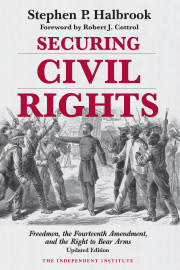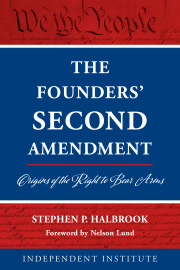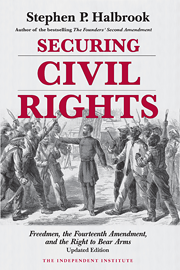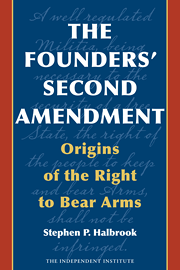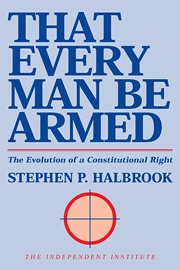Serious concerns exist concerning the nomination of Eric Holder for Attorney General regarding rights under the Second Amendment to the United States Constitution. His denial that law-abiding citizens have a right to keep and bear arms for lawful purposes is exemplified by his support for draconian proposal to criminalize, with severe felony penalties, exercise of that constitutional right.
Mr. Holder recently joined in an amici curiae brief in District of Columbia v. Heller arguing that the Second Amendment does not guarantee individual rights and supporting the D.C. handgun ban. It states: “Amici disagree with the current position of the United States Department of Justice that the Second Amendment protects an individual right to keep and bear arms for purposes unrelated to a State’s operation of a well-regulated militia.”[1] The brief relies in part on arguments by an attorney for the Violence Policy Center, a firearm prohibitionist lobby.[2]
The brief supports a 1968 Office of Legal Counsel analysis of a bill to “[r]equire the registration of every firearm in the United States” and to “[p]rovide a Federal system for licensing possession of firearms.” It opined that the Second Amendment “does not affect regulation of individual possession as proposed in this bill.”[3]
President-Elect Obama stated that he agrees with the Supreme Court’s decision in Heller confirming the Second Amendment guarantee of individual rights and invalidating the D.C. handgun ban. Mr. Holder has a career-long track record opposing those rights.
When Mr. Holder served as Deputy Attorney General (1997-2001) and Acting Attorney General (2001), the Department of Justice implemented policies hostile to Second Amendment rights. In the establishment of the national instant criminal background check system (“NICS”) in 1998, the Department claimed the authority to keep records on lawful firearm purchasers for an alleged “audit log” for six months, despite the law’s requirement that such records be destroyed and its prohibition on registration of firearm owners.[4] The record retention period for auditing was reduced to a mere 24 hours by regulation in the next Administration, and has since been so restricted by Congress in appropriations riders.
In that same period, the Department circulated draft legislation that would be included in a bill introduced by Congressman John Conyers as H.R. 1768 (106th Cong., 1999). The bill would have: Imposed felony penalties on a person who planned a gun show without registering with and reporting to ATF; made it unlawful for persons under age 21 to possess firearms, even though they vote, serve on juries, and serve in the military; imposed a 3-day waiting period, and limited handgun purchases to one per month; made it unlawful for a dealer to store firearms “not in conformity with regulations issued by ATF; “and required licensees to provide to ATF “monthly reports of all firearms obtained from non-licenses.”
In a 1999 interview with ABC, Mr. Holder was asked whether the Second Amendment recognizes “that citizens have a right to bear arms,” including the right to “buy a firearm?” He responded: “No court has ever said that the Second Amendment actually says that. I think, if you look at it, it talks about bearing gun in a well regulated militia. And I don’t think anywhere it talks about an individual.”[5] To the contrary, as Heller notes, State courts and the Supreme Court itself repeatedly stated that the Amendment guarantees throughout the nineteenth and twentieth centuries.[6]
After terrorists struck with box cutters on 9/11, Mr. Holder responded with an op-ed arguing for “background checks on all gun sales,” which would have extended felony penalties to the otherwise innocent, intrastate conduct of law-abiding private individuals. He added: “Congress should also pass legislation that would give the Bureau of Alcohol, Tobacco and Firearms a record of every firearm sale.”[7] Under the guise of combating terrorism, every American firearm owner would thus be registered with the government.
Mr. Holder served as the United States Attorney for the District of Columbia from 1993 to 1997. In that role, he asked the D.C. Council “to strengthen a law making possession of an unregistered firearm a felony and increasing the maximum prison term from one to five years.”[8] The Council kept the current misdemeanor penalties instead.
A prosecution under Mr. Holder’s supervision exhibited similar overkill on a technical firearm offense, diverting resources from violent crime. He was on the appeal briefs in Bieder v. United States, which was heard twice by the D.C. Court of Appeals.[9] That case concerned the prosecution of a visitor to the Capitol who had a New York license to carry a handgun and who sought to check it with a security guard at the entrance. He did this because “a handbook issued to him by New York authorities had cautioned against leaving firearms in unattended vehicles.” In the first appeal, the conviction was reversed because the trial court had not instructed the jury that the defendant was entitled under the federal Firearms Owners’ Protection Act to transport a firearm through different jurisdictions. While the conviction was upheld in the second appeal, the court only imposed a $150 fine for the unregistered firearm.
In sum, Eric Holder has taken a constricted view of Second Amendment rights. Millions of law-abiding Americans exercise the right to keep and bear arms. Mr. Holder’s opinion is that the people have no such right unless they are commanded to exercise it in a formal militia, which renders the right meaningless. He has advocated requiring that all firearm owners be registered with the government and that failure to comply be punished as a felony with substantial imprisonment. The restrictions he favors threaten civil liberties.
Many Americans have reason to be uneasy about Mr. Holder’s nomination for Attorney General. They deserve to have a person in this role who is committed to upholding all parts of the Constitution, including the Second Amendment. Unfortunately, Mr. Holder has proven himself not to be that person.
- Brief for Former Department of Justice Officials as Amici Curiae Supporting Petitioners, District of Columbia v. Heller, 07-290 (Jan. 2008), at 1.
- Id. at 30-32, citing Mathew S. Nosanchuk, The Embarrassing Interpretation of the Second Amendment, 29 N. Ky. L. Rev. 705, 713-36 (2002). Nosanchuk was the Litigation Director and
- Legislative Counsel for the Violence Policy Center., Id. at 23-24.
- Legislative Counsel for the Violence Policy Center., Compare 28 C.F.R. § 25.9(b)(1) (1998) with 18 U.S.C. §§ 922(t)(2), 926(a).
- Gun Control Debate, ABC This Week, May 2, 1999.
- District of Columbia v. Heller, 128 S. Ct. 2783, 2793, 2808-09, 2812-16 (2008).
- Holder, “Keeping Guns Away From Terrorists,” Washington Post, Oct. 25, 2001, A31.
- “Area agencies aim to silence guns in District,” Washington Times, Mar. 11, 1995.
- Bieder v. United States, 662 A.2d 185 (D.C. 1995), later proceeding, 707 A.2d 781, 782 (D.C. 1998).



